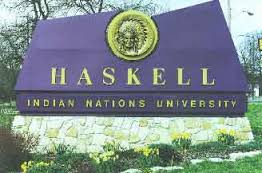
- Details
- By Native News Online Staff
LAWRENCE, Kan. — Citing the ongoing COVID-19 pandemic, Haskell Indian Nations University announced today that its administration has decided to shift exclusively to online/distance learning courses for the fall 2020 semester.
“We are planning to support our students’ academic progress and success in the most effective means available to us until the imminent threat of the spread of COVID-19 passes,” the announcement reads. ”Haskell has strategically used CARES Act funds to create the physical and personnel infrastructure to build a high-quality user experience and online learning system for just this situation. We are now well-positioned to introduce a robust distance learning platform for the fall semester.”
The announcement discusses how Indian Country has been affected dramatically by the COVID-19 virus and how Haskell wants to avoid at all costs the serious effects that would result from in-person classes during a health crisis at a higher learning institution.
Haskell officials said the decision to exclusive online/distance learning decision was made with the following criteria:
- What would provide the greatest safety measures and educational/professional progress of Haskell students, faculty, staff, and tribal communities they represent, many of whom are categorized as being high risk?
- How would enrollment be affected by the availability of low-cost and high-quality education alternative for those students who cannot attend Haskell in the traditional in-person setting?
Haskell’s faculty and staff are spending this summer preparing for the new academic year, ensuring the student experience is rich, rewarding, and memorable.
“As a result of this cautious, well-planned strategy, academic progress will be assured to all students, safety and health will be preserved among our tribal communities, and Haskell will continue to meet its mission to serve the needs of Indian Country,” the announcement concludes.
Haskell is a federally operated university. Haskell was originally an Indian boarding school when it was established in 1884. It now has a student population of 1,000 each semester with American Indians from over 140 enrolled.
Notable Haskell alumni include multi-sport athlete Jim Thorpe, Olympian Billy Mills, Congresswoman Sharice Davids and National Indian Gaming Association Chairman Ernest Stevens, Jr.
To learn more about Haskell online offerings this fall, go to www.haskell.edu.
More Stories Like This
Native Forward Scholars Fund Announces 2025 Students of the Year at Empowering Scholars SummitNavajo Nation Speaker Curley and Council Delegate Dr. Nez Join Education Leaders to Address Federal Budget Cuts
Mackie Moore (Cherokee) Named Interim President of Haskell Indian Nations University
Mohawk Students File Legal Suit Over Changes Impacting Access to Federal Financial Aid
Trump Administration Proposes Deep Cuts to Tribal College Funding, Threatening Their Survival
Help us tell the stories that could save Native languages and food traditions
At a critical moment for Indian Country, Native News Online is embarking on our most ambitious reporting project yet: "Cultivating Culture," a three-year investigation into two forces shaping Native community survival—food sovereignty and language revitalization.
The devastating impact of COVID-19 accelerated the loss of Native elders and with them, irreplaceable cultural knowledge. Yet across tribal communities, innovative leaders are fighting back, reclaiming traditional food systems and breathing new life into Native languages. These aren't just cultural preservation efforts—they're powerful pathways to community health, healing, and resilience.
Our dedicated reporting team will spend three years documenting these stories through on-the-ground reporting in 18 tribal communities, producing over 200 in-depth stories, 18 podcast episodes, and multimedia content that amplifies Indigenous voices. We'll show policymakers, funders, and allies how cultural restoration directly impacts physical and mental wellness while celebrating successful models of sovereignty and self-determination.
This isn't corporate media parachuting into Indian Country for a quick story. This is sustained, relationship-based journalism by Native reporters who understand these communities. It's "Warrior Journalism"—fearless reporting that serves the 5.5 million readers who depend on us for news that mainstream media often ignores.
We need your help right now. While we've secured partial funding, we're still $450,000 short of our three-year budget. Our immediate goal is $25,000 this month to keep this critical work moving forward—funding reporter salaries, travel to remote communities, photography, and the deep reporting these stories deserve.
Every dollar directly supports Indigenous journalists telling Indigenous stories. Whether it's $5 or $50, your contribution ensures these vital narratives of resilience, innovation, and hope don't disappear into silence.
 The stakes couldn't be higher. Native languages are being lost at an alarming rate. Food insecurity plagues many tribal communities. But solutions are emerging, and these stories need to be told.
The stakes couldn't be higher. Native languages are being lost at an alarming rate. Food insecurity plagues many tribal communities. But solutions are emerging, and these stories need to be told.
Support independent Native journalism. Fund the stories that matter.
Levi Rickert (Potawatomi), Editor & Publisher

